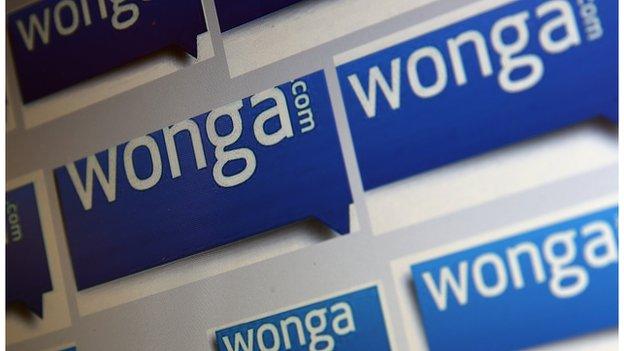Wonga - what, no fine?
- Published
- comments

Wonga is to pay compensation to customers it sent letter to from fake law firms
The immediate question to strike you when you look at the announcement this morning on Wonga is why has the payday lender not been fined?
It would seem a pretty open and shut case. Wonga sent out fake lawyers' letters to 45,000 people who were in arrears threatening legal action.
The letters had bogus letterheads claiming they were from firms with exotic names such as "Chainey, D'Amato & Shannon" and "Barker and Lowe Legal Recoveries". No such businesses existed.
The Financial Conduct Authority also found evidence that Wonga added charges to people's accounts to cover "administration fees" for the letters which it had written itself.
That takes some chutzpah.
Insufficient controls
The second part of the FCA's findings it published this morning concerns over-charging people for the loans they had taken out. It seems that 200,000 people fall into this category - though the over-charging sums are relatively small at less than a fiver.
Such was the confusion at the company that Wonga actually lost more money under-charging people than it gained from the over-charging. Understandably, the company is not going to chase those who haven't paid enough.
The cases cover a period between 2008 and 2010 when the business was growing rapidly. And, clearly, with insufficient controls.
Wonga has agreed to pay compensation to the victims which the FCA says could total £2.6m. "Could" is the operative word - it depends on people coming forward and claiming as well as Wonga pro-actively finding them.
People move around. Many people who take out Wonga loans are students or young, highly mobile workers.
The compensation is all very well, and indeed the FCA has praised Wonga for co-operating with the inquiry.
'Pretty ridiculous'
But shouldn't there be a fine as well?
Well, the explanation for why there isn't could well make an episode of Yes Minister.
The original investigation into Wonga was started in 2011 by the Office of Fair Trading. The OFT was disbanded this year and its functions for consumer credit companies handed to the FCA.
The FCA does not have the power to fine a company for errors it made before it was regulated by the FCA.
Which might strike some in this case as pretty ridiculous.
Firstly, why did the OFT take so long to come to any conclusions about Wonga that the government had already decided to close it down?
Maybe the two issues are linked. OFT was certainly rarely described as "fleet footed".
Secondly, why weren't some reserve powers contained in the legislation changing the role of the OFT to allow the FCA to retrospectively fine organisations in certain, carefully prescribed situations?
Of course, retrospective action has to be carefully controlled. But as in the Payment Protection Insurance debacle, even if the rules against the behaviour may not have existed at the time, financial institutions can still be obliged to pay redress.
Compensation is one thing. A fine on top of that is supposed to be the punishment for bad behaviour.